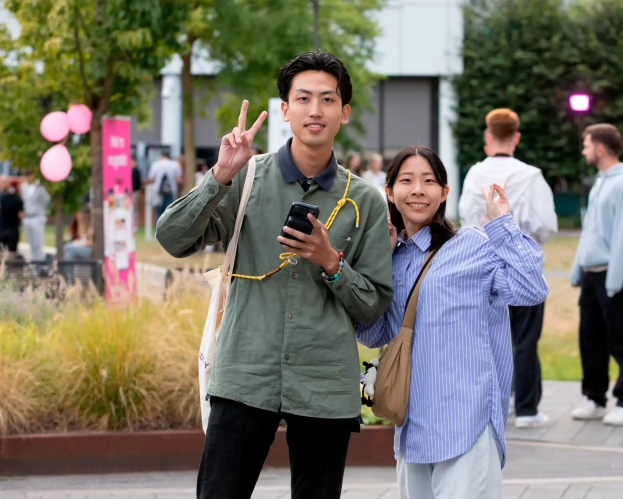

Working in the Netherlands
Do I need a work permit if I do an internship at a Dutch Company as a part of my study?
The employer does not need to apply for a work permit for you. The employer must, however, be able to present an internship agreement to the Labour Inspectorate, upon request.
You are legally obliged to sign an internship agreement with your higher education institution and internship employer. We strongly advise you to use the standard internship agreement for non-EU-EEA students drawn up by Nuffic in consultation with the Dutch government.
student trainee agreement (three party contract)
Work permit
If you want to work during your studies while staying in the Netherlands, there are some things to keep in mind.
- Are you from the EU/EEA or Switzerland?
If you are from the EU/EEA or Switzerland you are free to work without restrictions. You do not need a work permit and there are no restrictions regarding working hours.
- Are you from outside Europe?
If you are not from the EU/EEA or Switzerland, there are some restrictions if you want to work alongside your studies. You can either work for a maximum of 16 hours a week during the year, or you can work fulltime during the months of June, July and August, but only with a work permit.
Work Permit Application Process:
Your employer has to apply for your work permit (Tewerkstellingsvergunning or short the TWV) at least 5 weeks prior to the start of your employment. The application is free of charge. You cannot apply for the permit yourself. The organization that issues work permits is called the Employee Insurance Agency (UWV). The work permit application must be accompanied by a copy of your residence permit for study purposes and a statement from your education institution confirming that you are enrolled as a student at that institution.
In the case of students seeking to work part-time alongside their studies, there is a simplified application procedure whereby the UWV does not have to perform all the checks stipulated in the Foreign Nationals Employment Act (Wet arbeid vreemdelingen, WAV). Employers are not always aware of this simplified procedure and may therefore be wary about applying for a work permit. There is no need for this, however.
This is the website for your employer to apply for your work permit as a work student:
Apply for work permit
The Inspectorate SZW carries out inspections to check whether work permits were issued. If they were not issued this constitutes illegal employment, which is a violation of the Foreign Nationals Employment Act and punishable with severe fines for your employer and the risk for you to lose your residence permit.
Note: As soon as you have a (part-time) job, you are required to have a Dutch public health insurance.
In addition to your studies, you are allowed to work in the Netherlands as a self employed individual, as long as you continue to meet the requirements for your residence permit for study. There is no limit to the amount of hours that you are allowed to work as a self employed individual. Also, you do not need a working permit (TWV).
You do need to register your company in the Dutch Chamber of Commerce (Kamer van Koophandel). You need to pay taxes yourself. Whether it is compulsory for you to take out Dutch public healthcare insurance depends on your situation. To find out, you can undergo a Wlz review carried out by the SVB.
The employer does not need to apply for a work permit for you. The employer must, however, be able to present an internship agreement to the Labour Inspectorate, upon request.
You are legally obliged to sign an internship agreement with your higher education institution and internship employer. We strongly advise you to use the standard internship agreement for non-EU-EEA students drawn up by Nuffic in consultation with the Dutch government.
student trainee agreement (three party contract)
Note: If you are doing an internship for which you are paid at least as much as the Dutch minimum wage, you are subject to compulsory insurance under the Wlz scheme. Check this explanation of the minimum wage. If you receive expenses this will also count as remuneration for your internship. Contact the SVB (Sociale Verzekeringsbank), which is the organisation that implements national insurance schemes in the Netherlands and start the Wlz assessment when you are in doubt.
If you combine your study with a part time job related to your study or you have a student job or you are an international intern receiving at least the Dutch minimum wage that applies to your specific situation, you are considered to be insured under the Dutch Health Insurance Act (WLZ)
- You are required to have a Dutch Basic Health Insurance.
Our recommendation
We recommend the health insurer InsureToStudy This Dutch health insurer is able to provide services in English and can answer any further questions you might have regarding the Dutch standard health insurance.
If you already have an InsureToStudy insurance (or if you are willing to take out one), you can profit a very low priced Dutch Basic Health insurance combination with Hollandzorg. This insurance can be applied to and be cancelled on a daily base which means that you can easily switch this insurance on if you start working and off the day you have stopped.
Of course you are free to take out any other basic health care insurance but without any special price or arrangements. Find a list of providers here
Note: You will risk a big fine if you don't take out the Dutch Basic Health insurance if you are obliged to.
Read more about working while studying in The NetherlandsReceived a letter from the CAK?
You might receive a letter from the CAK about your insurance obligation. You need to take action within 3 months or you will receive a fine. Even if you incorrectly received the letter from the CAK.
It is important to contact the Sociale Verzekeringsbank (SVB) to request (free of charge) an investigation of your insurance position under the Wlz scheme.

